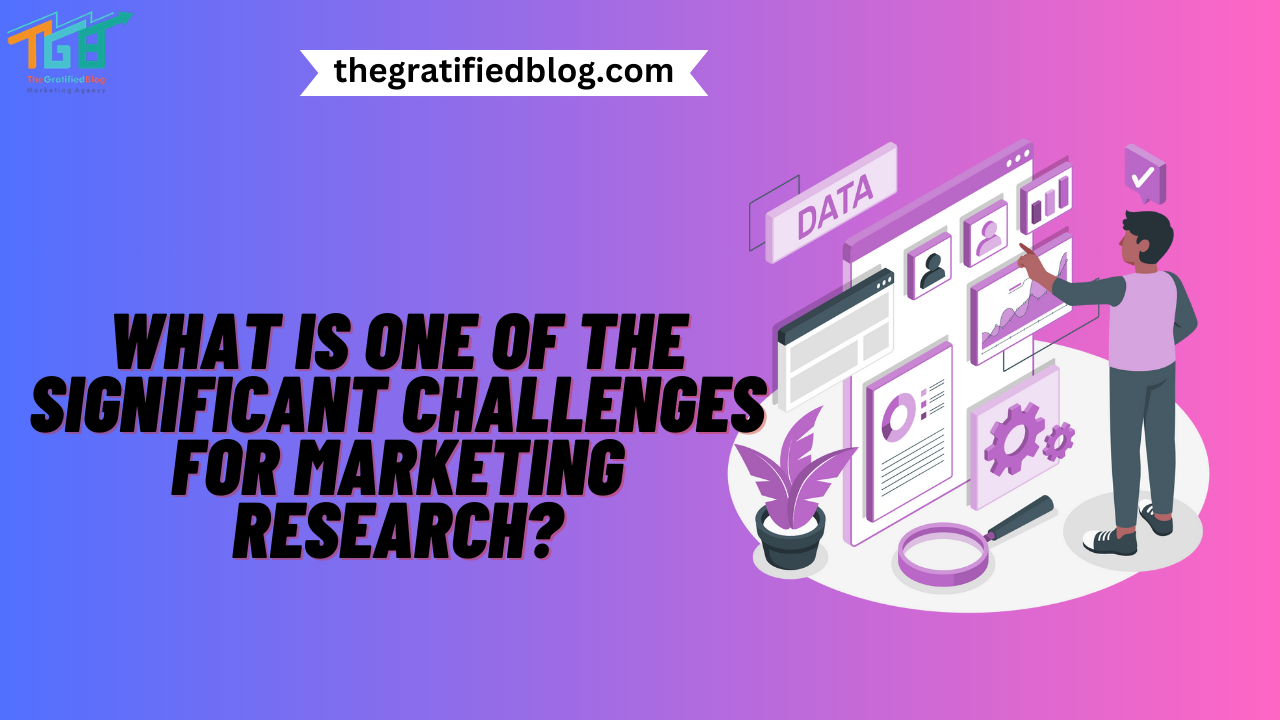
Marketing research is crucial for a successful business strategy, providing valuable insights into consumer behavior, market trends, and competitive landscapes. This information helps companies make informed decisions and create effective marketing campaigns. However, in the rapidly evolving digital age, marketing research encounters numerous challenges that can affect accuracy and relevance. What is one of the significant challenges for marketing research?
One of the most significant challenges is the growing concern over data privacy and the ethical use of consumer information.
In this article, we will explore the implications of this challenge for marketing research and discuss potential solutions to address it.
What Is Marketing Research?
Marketing research involves collecting, analyzing, and interpreting information about a market; market research encompasses details about the intended audience, rivals, and the overarching industry.
Assisting businesses in making informed decisions is crucial to their products, services, and marketing strategies.
One of the significant challenges in conducting marketing research is ensuring the data’s accuracy and relevance to the current market dynamics.
Here are four critical aspects of marketing research that underscore the need to challenge what you can to stay ahead in today’s competitive landscape:
Data Collection
That is the foundation of marketing research. It involves gathering data from various sources, including surveys, interviews, focus groups, observations, online research, and more.
Data can be primary (collected directly from the source) and secondary (collected from existing sources like reports, publications, or databases).
Once the data collection process begins, researchers must carefully plan and design their methods to ensure the information collected is relevant and accurate.
Surveys and interviews often require well-structured questionnaires and skilled interviewers to extract valuable insights from respondents. In contrast, focus groups enable researchers to delve deeper into consumer opinions and attitudes.
Observations can provide unfiltered data by simply watching and recording behaviors or events. Online research offers real-time consumer behavior and sentiment insights using web analytics and social media monitoring tools.
Secondary data, on the other hand, can provide historical context and industry benchmarks, but it’s crucial to assess its credibility and relevance.
Effective data collection sets the stage for subsequent analysis, helping businesses make informed decisions and refine their marketing strategies for better results.
It is the cornerstone upon which marketing research builds a bridge between companies and their target audiences.
Data Analysis
After gathering data, the next step involves analyzing it to derive significant insights. Statistical techniques, data mining, and qualitative analysis methods are often used to uncover data trends, patterns, and correlations.
The goal is to turn raw data into actionable information that can inform marketing decisions. This process begins with data cleaning and preprocessing, where outliers and inconsistencies are addressed to ensure the accuracy of results.
Then, descriptive statistics summarize and present the data’s key characteristics, such as mean, median, and standard deviation.
Once the data is well understood, inferential statistics can be applied to make predictions or Infer findings about a broader population based on the sample data. Hypothesis testing helps determine the significance of relationships within the data.
In this context, data visualization plays a pivotal role, allowing for the creation of graphs, charts, and dashboards that make complex information more accessible.
Leveraging machine learning algorithms is another way to build predictive models forecasting future trends or customer behavior.
Data analysis is a multifaceted process that transforms raw data into actionable insights through various statistical, visualization, and machine-learning techniques, ultimately guiding informed marketing strategies and decisions.
Market Segmentation
One of the critical goals of marketing research is to segment the market into distinct groups of consumers who share similar characteristics or needs.
This enables businesses to customize their marketing strategies to specific segments, thereby increasing the effectiveness of their efforts.
Market segmentation can be based on demographics, psychographics, behavior, or other relevant factors.
By analyzing demographics such as age, gender, income, and location, companies can understand the diverse preferences of their target audience.
Psychographic segmentation delves deeper into consumers’ values, interests, and lifestyles, providing valuable insights for personalized messaging. Behavior-based segmentation focuses on customer actions, like purchase history or brand loyalty, to predict future behaviors.
Effective segmentation enables businesses to allocate resources efficiently, ensuring marketing campaigns reach the right people with the right message.
It helps craft compelling advertisements and product offerings that connect with every segment, ultimately leading to increased sales and customer satisfaction.
As markets evolve, companies must continually reassess their segmentation strategies to stay ahead of changing consumer trends and preferences.
Market segmentation is vital for modern businesses to remain competitive and relevant in today’s dynamic marketplace.
Competitive Analysis
Gaining insights into the competitive terrain is crucial for any business. Marketing research helps assess the competitors, their strengths and weaknesses, and their position in the market.
This information is crucial for businesses to develop strategies to give them a competitive edge. Companies must identify their key rivals in a highly competitive market and gather data on their products, pricing, and market share.
With this knowledge, businesses can pinpoint market voids or areas where they have opportunities to outperform their competitors.
Grasping competitors’ strengths and weaknesses enables Businesses to use this information to make well-informed decisions regarding pricing, product strategy development, and marketing campaigns.
This analysis can also unveil opportunities for collaboration or strategic partnerships with complementary players in the industry.
Regularly monitoring the competitive landscape is vital because It enables businesses to adjust to evolving market conditions and customer preferences.
Competitive analysis empowers companies to navigate the dynamic business environment successfully, ultimately leading to growth and long-term success.
What Is One Of The Significant Challenges For Marketing Research?
Data Privacy And Ethics
One of the most pressing challenges facing marketing research today is the ethical use of consumer data and concerns over data privacy.
Technological advancements and the growing scope of sophisticated data collection have blurred the line between legitimate research and invasive data practices.
Here are some critical issues associated with this challenge:
Consumer Trust:
Consumer Trust: Frequent data breaches and misuse of personal data make consumers hesitant to share information. This distrust hampers survey participation and research efforts, hindering marketers’ data collection.
To rebuild trust, transparency and robust data protection measures are essential. Marketers must educate consumers on how their data will be used and assure them of its confidentiality. Marketers can enhance data quality and insights by addressing privacy concerns and fostering trust.
Ultimately, safeguarding consumer trust is paramount in the evolving landscape of data-driven marketing.
Regulatory Changes:
Regulatory Changes: Governments worldwide enact stricter data privacy regulations, such as GDPR in Europe and CCPA in the US, adding complexity and cost to research operations. Compliance mandates extensive data handling safeguards, impacting data collection methods and storage.
Researchers must obtain explicit consent, leading to potential sample size limitations and skewed data. Anonymization becomes paramount, making it challenging to draw insights from individual-level data.
Market researchers must invest in robust compliance frameworks and adapt methodologies to evolving regulations. Navigating this landscape requires continuous monitoring and strategic adjustments, ensuring research remains ethically sound and legally compliant.
Data Accuracy:
Privacy concerns can lead to diminished quality in marketing research surveys. Respondents may withhold or provide incomplete information, impacting the reliability of collected data.
To counter this, companies must prioritize transparency and data security. Implementing stringent privacy measures can build trust, ensuring accurate insights for informed decision-making.
Upholding ethical data practices becomes paramount as data-conscious consumers demand transparency in their business interactions. In this evolving landscape, maintaining data accuracy is not just a challenge but a necessity.
Ethical Concerns:
Some marketing research practices, like data scraping and invasive tracking, raise ethical concerns. Companies must balance data collection and individual privacy rights. Transparency is crucial to inform users about data usage.
Consent-based approaches should be favored over covert methods. Ethical guidelines and regulations must be adhered to, promoting responsible marketing research.
Ultimately, prioritizing ethics enhances trust and reputation in the industry.
Transparency And Consent:
Transparency and Consent: Ensuring respondents’ full awareness of data usage is challenging. Misleading practices pose ethical and legal risks. Clear communication is vital, detailing data purposes and seeking explicit consent. Honest disclosures foster trust and protect privacy rights.
Ethical dilemmas arise from information asymmetry. Legal repercussions loom without transparent, informed consent.
Data Security:
Protecting research data is vital, preventing breaches and their consequences. Encryption safeguards sensitive information, ensuring confidentiality. Access controls restrict data access solely to authorized personnel. Regular audits and updates maintain data integrity and compliance.
Ethical handling of data builds trust, avoiding reputational harm. Legal obligations reinforce the importance of robust data security measures.
Solutions To Address Data Privacy And Ethical Challenges

While data privacy and ethical concerns pose significant challenges for marketing research, there are several strategies and optimal approaches that can assist in alleviating these issues:
Transparency
Researchers should be transparent about collecting, storing, and using data. Well-defined and concise privacy policies and consent forms can help build trust with respondents.
This foundational principle ensures that participants understand the purpose and scope of the research, fostering a sense of confidence in the process.
Openly communicating the methods and safeguards for data protection cultivates an environment of informed consent.
Transparency serves as a safeguard against potential misuse of data, promoting ethical research practices. It enables individuals to make well-informed decisions about their choices and participation, respecting their autonomy.
In an era of increasing data concerns, transparent research practices uphold ethical standards and bolster research outcomes’ credibility.
Transparency acts as a cornerstone, ensuring that the rights and interests of participants are respected throughout the research journey.
Data Anonymization
Whenever feasible, personal data should be anonymized and aggregated to safeguard the identities of individuals. That reduces the risk of data breaches and misuse.
Anonymization involves removing or encrypting personally identifiable information, such as names and addresses, making it nearly impossible. It becomes unfeasible to trace data back to specific individuals.
By anonymizing data, organizations can still derive valuable insights while safeguarding privacy. This practice aligns with ethical data handling, ensuring that sensitive information remains confidential.
Anonymization aids compliance with data protection regulations like GDPR and CCPA, preventing hefty fines and legal repercussions.
In addition to bolstering privacy, anonymization fosters trust between data collectors and subjects. Individuals are likelier to share data if they believe their privacy is respected.
It’s not just a legal requirement but a fundamental ethical principle in today’s data-driven world.
Compliance With Regulations
Stay updated on data privacy regulations and ensure full compliance. Failure to do so can result in severe legal consequences and reputational damage.
It is essential to consistently review and adjust your data handling practices by evolving legislation. Establish stringent data protection policies and procedures to safeguard sensitive information.
Assign a specialized data protection officer to supervise compliance initiatives and stay updated on regulatory shifts. Perform routine audits and risk assessments to pinpoint vulnerabilities and address them promptly.
Educate your personnel on the best data protection practices and adhering to these regulations. Incorporate transparency into your data processing operations by effectively conveying privacy policies to customers and securing informed consent.
By prioritizing compliance, your organization can mitigate legal risks, build trust, and enhance its reputation in an increasingly data-conscious world.
Data Security Measures
Implement robust data security measures to protect collected data from unauthorized access or breaches. Regular security audits are essential. These audits should scrutinize your network, systems, and software for vulnerabilities, ensuring prompt patching of any weaknesses.
It employs encryption protocols to safeguard data in transit and at rest, making it difficult for malicious actors to intercept or steal sensitive information.
Establish strict access controls, limiting data access restricted solely to authorized personnel by their roles and responsibilities.
Implement multi-factor authentication (MFA) to enhance user verification and bolster security. Continuous monitoring and intrusion detection systems should be in place to detect and respond swiftly to suspicious activities.
Educate your staff on security best practices to create a culture of awareness and vigilance, making data security a shared responsibility across your organization.
Ethical Guidelines
Develop and adhere to ethical guidelines for marketing research practices within your organization. That includes respecting respondents’ rights and privacy.
Ensuring ethical research is paramount in maintaining trust with participants. Safeguard their sensitive information and maintain confidentiality throughout the process.
Ensuring openness in data collection and utilization is crucial to fostering trust and credibility. Prioritize informed consent, allowing respondents to make fully informed decisions about their participation.
Upholding ethical standards also means avoiding any form of manipulation, coercion, or deception in your research methodologies. Ethical guidelines protect respondents and promote the integrity of your organization’s research efforts.
Ultimately, ethical marketing research practices are the cornerstone of building enduring relationships and sustaining your brand’s reputation.
Educating Respondents
Informing respondents about the significance of their participation in research and their vital role in enhancing products and services is a fundamental step.
Building awareness about the broader impact of their involvement can go a long way in alleviating any concerns they may have.
Clearly articulating the purpose of the research and how their data will be used empowers respondents to make informed decisions.
When respondents understand that their input can shape future innovations, it fosters a sense of ownership and engagement.
Explaining the confidentiality measures in place assures them of data security. Transparent communication ensures respondents feel valued and respected, contributing to higher response rates and richer data quality.
By fostering this sense of responsibility and trust, researchers can create a more productive and ethical research environment, leading to more meaningful and actionable insights.
Educating respondents benefits the research process and cultivates a sense of partnership and shared goals between researchers and respondents.
Innovation In Data Collection
Explore innovative data collection methods that respect privacy, such as blockchain-based surveys that allow individuals to control their data.
These surveys leverage blockchain technology to give users unprecedented control over their personal information, ensuring their data remains secure and confidential.
Machine learning algorithms can analyze vast datasets without compromising individual privacy. This approach anonymizes and aggregates data, preserving the anonymity of participants.
Federated learning techniques enable collaborative model training without centralizing sensitive data, safeguarding privacy while advancing data-driven insights.
Emerging technologies like homomorphic encryption also offer promising avenues for secure data analysis, allowing computations on encrypted data without exposing the underlying information.
These innovations foster a balance between data collection and privacy, driving forward the field of data science while respecting individuals’ rights and concerns.
Third-Party Vendors
If using third-party vendors for data collection, ensure they uphold high ethical standards and comply with data privacy regulations. Thoroughly vet potential partners to confirm their commitment to safeguarding sensitive information.
Establish clear contractual agreements that outline data handling and protection expectations. Regularly audit vendor practices to verify ongoing compliance and data security. Maintain open communication channels to address any concerns promptly.
Your organization can enhance data integrity and stakeholder trust by prioritizing ethical and compliant third-party relationships.
Conclusion
Marketing research is essential for businesses to thrive in today’s competitive landscape. However, the growing concerns over data privacy and ethical considerations present significant challenges.
To address these issues, companies must prioritize transparency, compliance with regulations, and the ethical use of consumer data. Building trust with respondents and protecting their adherence to privacy are legal obligations and vital for upholding the integrity of marketing research efforts.
By addressing these challenges head-on, businesses can continue to harness the power of marketing research to drive success while respecting individuals’ rights and privacy.








No Comments